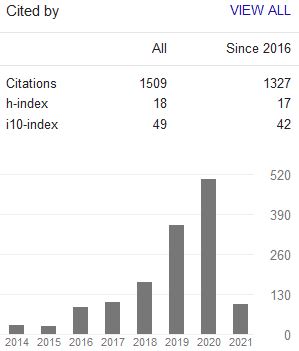THE FUZZY SACREDNESS AURA AND CYBER-BASED DA’WAH: Redrawing Karamah of Tuan Guru within The Belief System of Sasak Muslims
Abstract
Keywords
Full Text:
PDFReferences
“Sowan dan Mencium Tangan Kiai.” https://islam.nu.or.id/post/-read/39396/sowan-dan-mencium-tangan-kyai.
Abdullah, Taufik. “The Formation of a New Paradigm? A Sketch on Contemporary Islamic Discourse.” Mark Woodward (ed.), Toward a New Paradigm: Recent Developments in Indonesia Islamic Thought. Tempe: Arizona University Program for Southeast Asia Studies, 1996.
Al-Maraqi, Muslih. an-Nur al-Burhani fi Tarjamah al-Lujain ad-Dani. Vol 1, Semarang: Toha Putra, 1962a.
Al-Tirmidi, Muḥammad ibn ʻAli al-Ḥakim. Kitab Khatm al-Awliyā’, Beirut: al-Maṭbaʻat al-kāthūlīkīyat, 1965.
Amin, Samsul Munir. Sejarah Peradaban Islam. Jakarta: Amzah, 2015.
----------. Karomah Para Kiai. Yogyakarta: LKIS. 2008.
Arbi, Ivany Atina. “Mosques Losing Sway Over Youth because of Online Sermons, Study Shows”. The Jakarta Post. (February 10, 2019).
Aziz, Moh Ali. Ilmu Dakwah. Jakarta: Prenada Media, 2019.
Brofirstmly, David G. “Charisma and Leadership: Charisma and Charistmatic Authority.” D Chryssides and Benjamanin E Zeller (eds), The Bloomsbury Companion to New Religious Movements. UK: Bloomsbury Academic, 2014.
Budiwanti, Erni. Islam Sasak: Wetu Telu versus Waktu Lima. Yogyakarta: LKiS, 2000.
Eickelman, Dale & J.W. Anderson. “Print, Islam, and the Prospect for Civic Pluralism: The New Religious Writings and Their Audiences.” Journal of Islamic Studies 8, 1 (1997).
Fahrurrozi. “Tuan Guru antara Idealitas Normatif dengan Realitas Sosial pada Masyarakat Lombok.” Jurnal Penelitian Keislaman 7, 1 (2010).
Foucault, Brooke and Jay Melican. “The Digital and the Divine: Taking a Ritual View of Communication and ICT Interaction.” N. Aykin (ed.). Usability and Internationalization, Part I (HCII 2007).
Golan, Oren and Michele Martini. “Religious Live-Streaming: Constructing the Authentic in Real Time.” Information, Commu-nication & Society 22, 3 (2019).
Graham, William A. “Traditionalism in Islam: An Essay in Interpretation.” The Journal of Interdisciplinary History 23, 3 (1993).
Hatta, M. “Media Sosial sebagai Sumber Keberagamaan Alternatif Remaja dalam Fenomena Cyberreligion.” Jurnal Kajian Dakwah dan Kemasyarakatan 22, 1 (2018).
Helland, Christopher. “Ritual.” Heidi Campbell (ed.). Digital Religion: Understanding Religious Practice in New Media Worlds. New York: Routledge, 2012.
Helland, Christopher. Virtual Religion: A Case Study of Virtual Tibet. Oxford: Handbook Online. 2015.
Hoesterey, J.B. “Prophetic Cosmopolitanism: Islam, Pop Psychology, and Civic Virtue in Indonesia.” City and Society 24, 1 (2012).
Jamaluddin. “Islam Sasak: Sejarah Sosial Keagamaan Masyarakat Sasak Abad XVI-XIX.” Jurnal Indo-Islamika 1, 1 (2011).
----------. Persepsi dan Sikap Masyarakat Sasak Terhadap Tuan Guru. Yogyakarta: CRCS, 2007.
Jamhari, Arif. “The Majlis Dhikr of Indonesia: Exposition of Some Aspects of Ritual Practices.” Journal of Indonesia Islam 3, 1 (2009).
----------. Rituals of Islamic Spirituality: A Study of Majlis Dhikr Groups in East Java. Camberra: ANU E-Press, 2010.
Kasdi, Abdurrahman. “The Role of Walisongo in Developing Islam Nusantara Civilization.” Addin 11, 1 (2017).
Kingsley, Jeremy J. “Peacemakers or Peace-Breakers? Provincial Elections and Religious Leadership in Lombok, Indonesia.” Indonesia 93 (2012).
----------. “Redrawing Lines of Religious Authority in Lombok, Indonesia.” Asian Journal of Social Science 42, 5 (2014).
Kurniawan, Ade Fakih et.al. “Wali and Karamah: A Discourse and Authority Contestation in al-Tarmasi’s Bughyat al-Adhkiyā’.” Al-Jamiáh Journal of Islamic Studies 57, 2 (2019).
Ma’luf, Louis. al Munjid fi al Lughah wa al a'lam. Beirut: Dar al-Fikr, 1937.
Mulkan, Abdul Munir. Ideologisasi Gerakan Dakwah. Yogyakarta: Sipres, 1996.
Nasution, Harun. Falsafah dan Mistisisme dalam Islam. Jakarta: Bulan Bintang, 1992.
Putrawan, Agus Dedi, “Dekramatisasi Tuan Guru di Pulau Lombok Nusa Tenggara Barat.” Right Jurnal Agama dan Hak Azazi Manusia 5, 2 (2014).
Rahmat. “Piwulang Sunan Kalijaga (Teks tentang Mantra): Deskripsi Teks dan Akulturasi Bahasa.” Jumantara 7, 1 (2016).
Rijal, Syamsul. “Performing Arab Saints and Marketing the Prophet: Habaib and Islamic Markets in Contemporary Indone-sia.”Archipel (2020).
Rozaki, Abdur. Kahrisma Menuai Kuasa: Kiprah Kiai dan Blater sebagai Rezim Kembar di Madura. Yogyakarta: Pustaka Marwa, 2004.
Suprapto. “Sasak Muslims and Interreligious Harmony: Ethnographic Study of the Perang Topat Festival in Lombok – Indonesia.” Journal of Indonesian Islam 11, 1 (2017)
Solahudin, Dindin and Moch. Fakhruroji. “Internet and Islamic Learning Practices in Indonesia: Social Media, Religious Populism, and Religious Authority.” Religions (2019).
Turner, Bryan S. “Religious Authority and the New Media.” SAGE Journals 26, 2 (2007).
Weber, Max. On Charisma and Institution Building. London: Chicago Press, 1968.
Zamzami, Mukhammad. “Konstruksi Sosial-Teologis Ritual Ijazah Asma' Artho (Uang Azimat) di Pondok Pesantren Fathul Ulum Kwagean Pare Kediri.” Islamica Jurnal Studi Keislaman 12, 2 (2018).
DOI: 10.15642/JIIS.2020.14.2.457-476
Refbacks
- There are currently no refbacks.
Indexed by:
Journal of Indonesian Islam (ISSN 1978-6301 and E-ISSN 2355-6994) is published by the Postgraduate Program (PPs) and the Institute for the Study of Religion and Society (LSAS), State Islamic University (UIN) of Sunan Ampel Surabaya.
Journal of Indonesian Islam by http://jiis.uinsby.ac.id/index.php/JIIs/index is licensed under a Creative Commons Attribution-ShareAlike 4.0 International License.
Copyright ©2020 State Islamic University (UIN) of Sunan Ampel Surabaya. Powered by Public Knowledge Project OJS.







